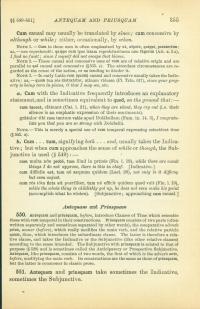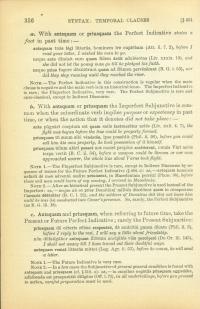550. Antequam and priusquam (before) introduce clauses of time which resemble those with cum temporal in their constructions. Priusquam consists of two parts (often written separately and sometimes separated by other words), the comparative adverb prius (sooner; before), which really modifies the main verb, and the relative particle quam (than), which introduces the subordinate clause. The latter is therefore a relative clause, and takes the indicative or the subjunctive (like other relative clauses) according to the sense intended. The subjunctive with priusquam is related to that of purpose (§ 529) and is sometimes called the Anticipatory or Prospective Subjunctive. Antequam, like priusquam, consists of two words, the first of which is the adverb ante (before) modifying the main verb. Its constructions are the same as those of priusquam, but the latter is commoner in classic prose.
551. Antequam and priusquam take sometimes the indicative sometimes the subjunctive.
a. With antequam or priusquam the perfect indicative states a fact in past time.
Antequam tuās lēgīlitterās, hominem īre cupiēbam. (Att. 2.7.2)
Before I read your letter, I wished the man to go.
Neque ante dīmīsit eum quam fidem deditadulēscēns. (Liv. 39.10)
And she did not let the young man go till he pledged his faith.
Neque prius fugere dēstitērunt quam ad flūmen pervēnērunt. (B. G. 1.53)
Nor did they stop running until they reached the river.
Note— The perfect indicative in this construction is regular when the main clause is negative and the main verb is in an historical tense. The imperfect indicative is rare; the pluperfect indicative, very rare. The perfect subjunctive is rare and ante-classical, except in indirect discourse.
b. With antequam or priusquam the imperfect subjunctive is common when the subordinate verb implies purpose or expectancy in past time, or when the action that it denotes did not take place.
Ante pūgnārī coeptum est quam satis īnstruerēturaciēs. (Liv. 22.4.7)
The fight was begun before the line could be properly formed.
Priusquam tū suum sibi vēnderēs, ipse possēdit. (Phil. 2.96)
Before you could sell him his own property, he took possession of it himself.
Priusquam tēlum abicī posset aut nostrī propius accēderent, omnis Vārī aciēs terga vertit. (B. C. 2.34)
Before a weapon could be thrown or our men approached nearer, the whole line about Varus took flight.
Note 1— The pluperfect subjunctive is rare, except in indirect discourse by sequence of tenses for the future perfect indicative (§ 484.c).
Antequam hominēs nefāriī dē meō adventū audīre potuissent, in Macedoniam perrēxī. (Planc. 98)
Before those evil men could learn of my coming, I arrived in Macedonia.
Note 2— After an historical present the present subjunctive is used instead of the imperfect.
Prius Domitiānī mīlitēs discēdunt quam in cōnspectum Caesaris dēdūcātur. (B. C. 1.22)
And the soldiers of Domitius did (do) not leave him until he was (is) conducted into Cæsar's presence.
So, rarely, the perfect subjunctive (as B. G. 3.18).
c. Antequam and priusquam, when referring to future time, take the present or future perfect indicative; rarely the present subjunctive.
Priusquam dē cēterīs rēbus respondeō, dē amīcitiā pauca dīcam. (Phil. 2.3)
Before I reply to the rest, I will say a little about friendship.
Nōn dēfatīgābor antequam illōrum ancipitēs viās percēperō. (De Or. 3.145)
I shall not weary till I have traced out their doubtful ways.
Antequam veniatlitterās mittet. (Leg. Agr. 2.53)
before he comes, he will send a letter.
Note 1— The future indicative is very rare.
Note 2— In a few cases the subjunctive of present general condition is found with antequam and priusquam (cf. § 518.a).
In omnibus negōtiīs priusquam aggrediāre, adhibenda est praeparātiō dīligēns. (Off. 1.73)
In all undertakings, before you proceed to action, careful preparation must be used.


